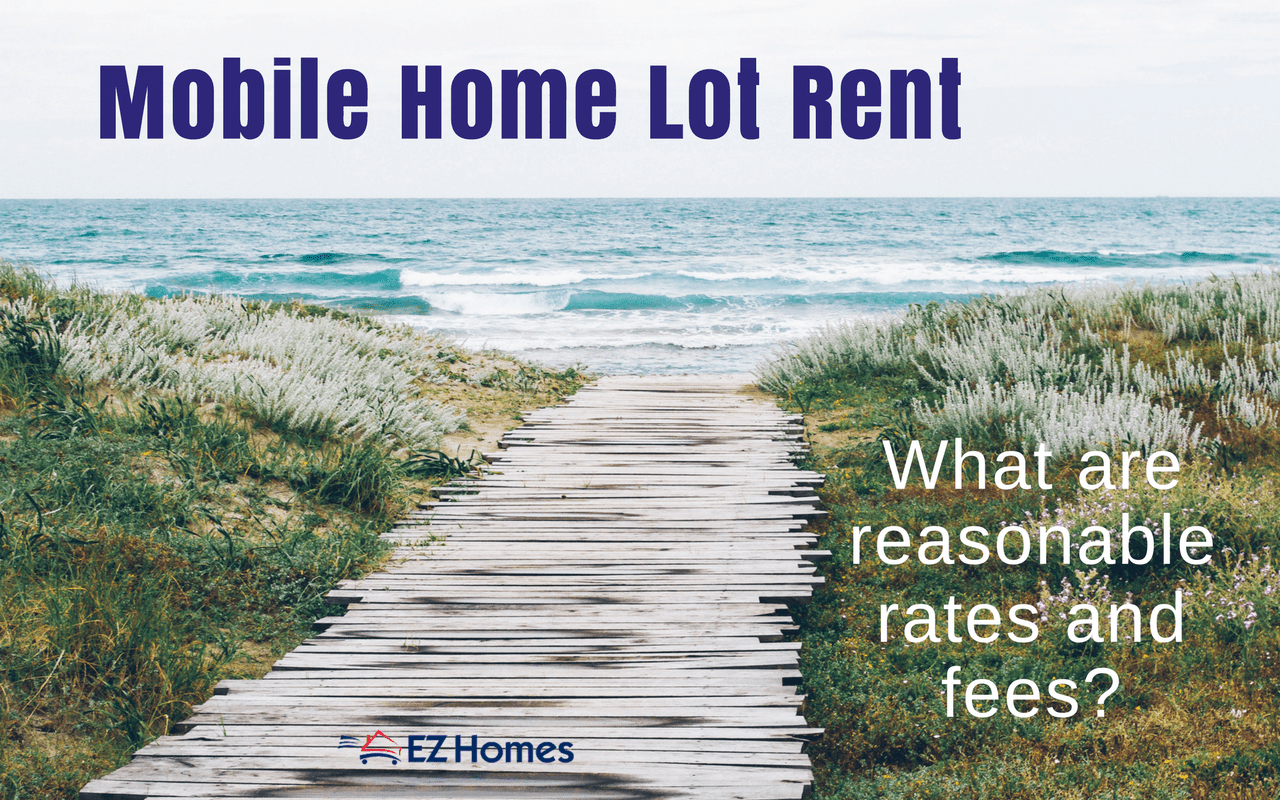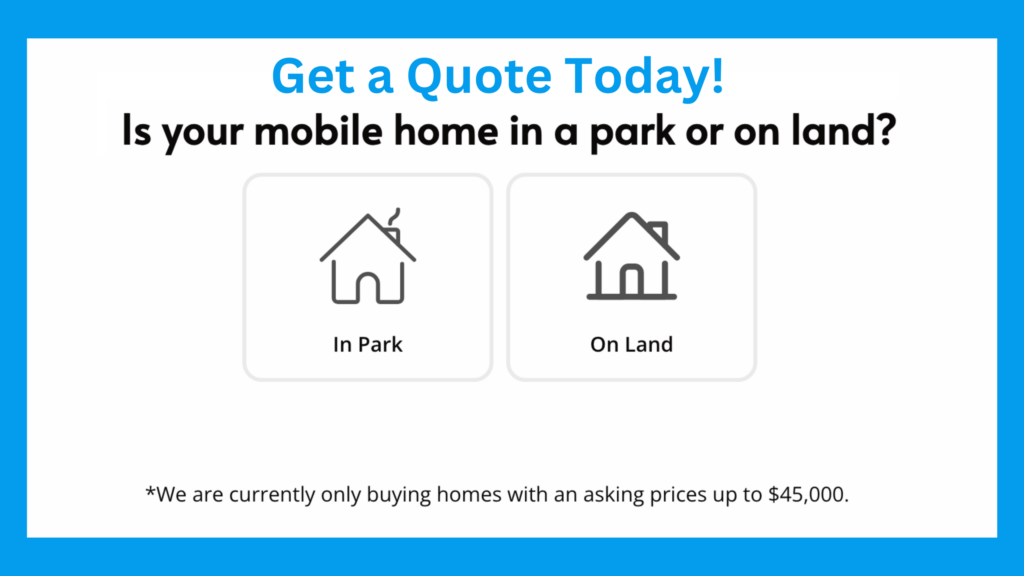Maybe you’re already convinced that moving into a mobile home is the right choice for you. You know you get a lot more bang for your buck regarding price, space, and ownership. You’re also aware that by far, most mobile home owners live inside mobile home parks. The convenience of living in a community where you feel like you belong and that will meet your needs as a mobile home owner is too much to ignore. You might be wondering then, what will mobile home lot rent cost you in one of these parks? And what is a reasonable amount?
Frustrated With Lot Rent? We Buy Mobile Homes In Parks. Get An Offer!
Of course, to answer this question truthfully and in a way that you can decide what’s best for you, we have to talk about what lot rent covers. What might seem like a deal may not seem so attractive if you find out you can get more somewhere else for only a slightly higher price. The average lot rent can also vary wildly from state to state. Some can cost more than double compared to others so we will look at that too.
What is mobile home lot rent?
To put it simply, mobile home lot rent is the amount you pay a mobile home park owner for a piece of land on which to place your mobile home for a specified period of time. It works just like any other type of rent where there are eviction procedures, rules for the tenant to follow, and an agreed-upon term for which the renter can use the space.
What might be included in mobile home lot rent?
You should carefully read your lease agreement with the mobile home park to establish precisely what lot rent will cover. Remember, you don’t want to sign up for services that you could get for free. You also want to know what you’re getting for your money so you can accurately compare your options.
It’s completely dependent on the park what services they include in the lot rent and which services are optional and come at an extra cost.
The lot
Depending on your own tastes and circumstances, you might be happier the bigger your lot is. After all, one of the main attractions of a mobile home is the ability to live the American dream at a fraction of the price with your whole family. For many, this might include having a pet (if your park allows), a garden to tend, and some outdoor entertainment space where you can have a bbq and play football with the boys.
Some states and cities specify and enforce a minimum lot size for different homes. For larger homes such as double-wides and triple-wides, the average lot size is usually around 3600 sq. ft. with a minimum of 40 ft. dimensions.
Across the board, lot size for smaller lots and single-wides is between 960 and 2600 sq. ft. It’s imperative you know what size your home is so that you know how much space you have left. Also, remember to account for the individual dimensions in width and length.
Garbage pickup

This one is almost a given. The only thing that might differ from park to park is how they bill you. Some may include the fees as part of your lot rental while others keep them separate. For convenience, it’s usually the former.
Municipalities usually have garbage pickups once a week. Ask your park owner what day that happens so you can take full advantage of it.
Utilities
Just like garbage pickup, utilities fall under basic services that most mobile home parks should (and do) include in their lot rent. Again, they might bill this in different ways. These could have a more significant impact on you than garbage fees:
- Divided equally: In this method, the mobile home park receives its utility bill in full and divides it up equally among the residents. This is probably the least preferred method as there is a lack of transparency and the more thrifty residents still need to cough up.
- Divided per resident: Through this method, each home has its own water and electricity meters installed. When the park gets billed, it sends each home an invoice for their individual usage.
- Flat rate: This one is rare, but you might encounter it. In this instance, mobile home parks charge a flat monthly rate for utilities. While it may be attractive because you have a fixed bill every month, it could also lead you to pay for more than you use.
In some parks, the owner or management has nothing to do with your bill at all. Each resident is charged and billed directly by the local municipality.
Gardening and upkeep
This one also largely depends on whether you own the mobile home or you are renting it along with the lot. Lease agreements should stipulate whether the park provides gardening services (included in the lot rent or at extra cost) as well as routine maintenance on the home if it’s owned by the park. Your lease agreement should also specify whether or not it covers problems with the home and whether this extends to the interior or exterior only.
Others
Your imagination is the limit when it comes to the fees mobile home parks can charge. These mostly depend on the amenities the park offers, such as a pool, bbq area, public cooking area, etc.
Cable TV
This is a very common value-added service that most mobile home parks offer in one way or another. However, it’s also one of the services that you should treat with the most amount of skepticism. Although it might seem appealing to have cable TV, the package and channels are chosen by the park owners.
You should see whether the channels are of any interest to you before getting too excited. There are many horror stories of park owners opting for a package they have a personal interest in yet making it mandatory for everyone. This leaves many having to get a second cable TV package while also technically paying for it in their lot rent.
What about taxes?
“In this world, nothing can be said to be certain, except death and taxes.” – Benjamin Franklin.
Have truer or more practical words ever been spoken? As much as many of us dread the word and anything to do with it, there is simply no shaking the fact that you will almost certainly be paying taxes. No matter who you are, what you do, what you own, or how much you earn, the taxman is always knocking.
The same is true when it comes to mobile homes. Luckily, if you rent a lot, it means you don’t own it, so you don’t have to pay real estate tax on the property. This is the responsibility of the mobile home park owner. Most likely, they cover this cost with your lot rent. The only tax you might have to pay is a property tax on the mobile home itself which is different depending on your state. It’s usually around 1-2% and payable to your local DMV.
Mobile home lot rent across the United States

Whenever you make a decision that involves money, it’s always important to be informed about the bigger picture so that you know whether what you are doing makes sense. To do this, we will look at average rental costs across the U.S. and compare that to the average lot rent.
Across the U.S., the average apartment rent hovers around $1,200 at the moment. Usually, this doesn’t even involve a particularly nice or spacious apartment in a good part of town. Of course, rent fluctuates greatly depending on the city. For example, you can get a very decent and modern flat with 800 sq. ft. of living space in Kansas for around $800, whereas the same kind of apartment in San Diego could cost you double that. San Francisco, the most expensive city in the U.S. right now, has an average rent of just below $4,000!!!
In sharp contrast, the average mobile home lot rent across the U.S. still hovers at a lowly $200-$300. If you also rent the home, or you are paying a mortgage on a mobile home you own, your total monthly costs should be around $700-$800.
State to state
Naturally, this varies wildly from state to state. California, as a higher-priced state, has lot rents between $500-$600. However, since mobile home prices are pretty standard because of national manufacturers, this same increase doesn’t necessarily extend to the home’s price.
This means that you could be renting a lot and paying off your mortgage in California for the same amount that you could rent an apartment in Kansas, a pretty astonishing fact.
Here are some of the states and their average mobile home lot rent. These figures come from current mobile home listings:
- Florida: $400
- California: $600
- Kansas: $200
- Nevada: $450
- Pennsylvania: $330
- Washington: $450
- South Carolina: $200
Now, this may beg the question, why is a mobile home lot rent so “cheap”? There are a few possible answers:
- The typical “mom and pop” owners that don’t have any professional working knowledge regarding housing markets haven’t increased their rent, leading to the price lagging slightly behind.
- Many people are still wary of the stigma attached to living in mobile home parks. This halts demand slightly even in the current housing crisis.
- Mobile homes themselves still cost far less than stick-built homes when bought new or used. This puts them in the category of affordable housing, and lot rent must follow suit.
Questions to ask before renting a mobile home lot:
What is the lot rent history and what are future projections?
From a financial perspective, this is crucial if you want to keep an eye on your future. Inflation might be the only other thing that is just as certain as death and taxes. Most lessees will feel its effect on a yearly basis.
Most will agree that a 10% increase in rent year on year is fair. However, some park owners might take advantage of their residents’ desperation and charge much more. You are therefore well within your rights to request the figures for the average lot rent over the last few years as well as projected future increases.
This way you can hold your park management accountable in the event of a baffling increase. Some mobile home park owners might try to prey on the fact that moving a mobile home is prohibitively expensive and raise their lot rents dramatically knowing that most tenants can’t afford the alternative.
What are the terms of your lease?
States tightly regulate what should be made plain in a lease agreement to protect mobile park owners and renters alike. Some of the things you should expect to find in any lease agreement are:
- The length of the lease.
- The rent amount.
- When rent is due every month.
- The security deposit amount and how it will be refunded.
- The condition of your lot (and mobile home) at the time the lease is signed.
- Any penalties for late rent payments.
- The process of terminating a lease.
- Potential rent increases and a general (or maximum) amount.
If you plan to rent the home as well as the lot, it shouldn’t be much different except that the rental of the home is included in the monthly payment.
What does the future of the mobile home park look like?

This one is very important. Mobile home parks have received some bad rep because of those that have shut up shop and order residents to evacuate within three months. This usually happens when a developer buys the park to put something else in its place.
You should find out whether the park has to get approval from the local properties to sell or change the purpose of the park grounds. It’s also a good idea to ask for the minimum notice period in an event like this.
What’s included in lot rent?
We already covered this thoroughly at the beginning of the article. You should always check which if any of these your lot rent covers and whether they are mandatory or optional.
What are your responsibilities as a tenant vs. those of the park owner?
This mostly comes down to things like the maintenance and upkeep of the lot and the mobile home itself. Obviously, the park has much less jurisdiction over the home if you are the owner, and much more if you rent it from them with the lot.
Usually, a lease agreement should specify who does the gardening, exterior, and interior maintenance, whether the home needs to maintain a certain standard or appearance, and who pays for what.
Now you’re ready to start looking!
We hope that this article has helped you understand mobile home lot rent and what you can expect to pay while getting what you and your family need and deserve. As you can see, mobile home lot rent depends on so many factors: location, amenities, the current market, conditions, etc., that it’s impossible to come up with a blanket answer for everyone. The best you can do is to inform yourself before you even start looking. Good luck!




